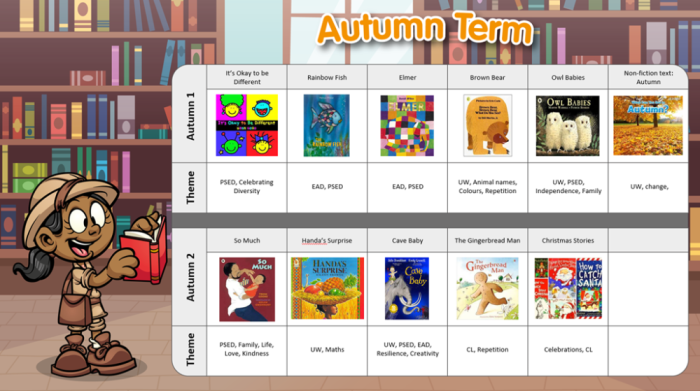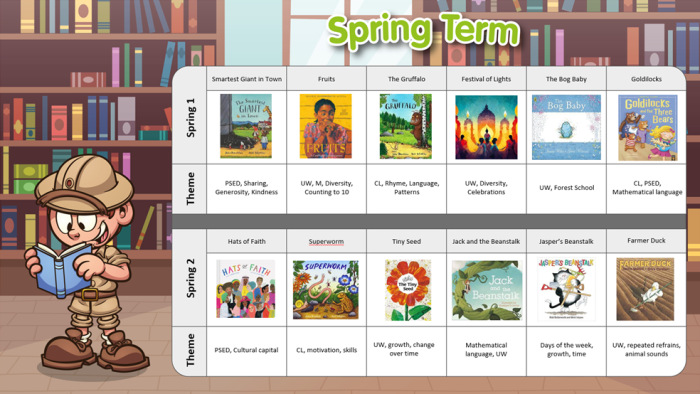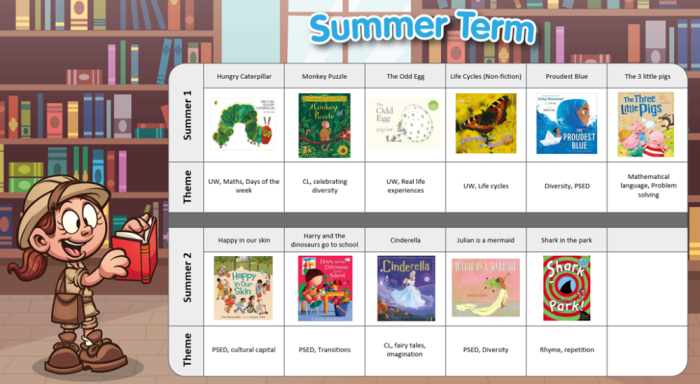Early Reading
A critical part of supporting early reading skills is to improve children’s language and communication skills and create a language-rich environment. Tenterfield’s total communication approach to all learning is therefore intrinsic to the delivery of early reading in the nursery. We know that reading is essential for all areas of learning and are therefore passionate about fostering a love of books and literature for all our children. Children with a solid foundation of early reading skills are more likely to become fluent readers and have greater success with future learning.
What do we do at Tenterfield to support Early Reading Development:
- Books and text are evident in each area of the nursery and are freely shared and accessible throughout the session.
- A full range of age appropriate books, both fiction and no-fiction depicting settings and scenarios familiar to all children, alongside traditional stories and poems
- Dedicated story time at least once a day delivered using books, puppets, props and role play.
- Use of story sacks to support story telling and linked resources within the environment to extend and enhance vocabulary
- Puppets, props and small world areas are created for children to create and tell their own stories
- Lending Library for the children to take home a book of their choice each week and share with family.
- ‘Reading Pets’ for each key group that are taken home in turn, in order they can be read to and introduced to favourite stories from home.
- Story building activities where the idea of characters, settings, problems and solutions are discovered, discussed, acted, drawn and often written down.
- A lending library available with children’s and adult books freely accessible outside the side entrance.
- World Book Day is celebrated annually with dressing up as story characters and activities themed around known stories
- Parent information and workshops throughout the year to support the learning at home and offer advice and activities.
Promoting a ‘love of reading’:
Every week we focus on a different, favourite story! The book is read repeatedly over the week, and there are plenty of ‘provocations to play’ based on the story theme!



Phonics:
Reading involves two skills, word recognition and comprehension. Children need to develop phonic skills to eventually help them master word recognition This process starts in the early years with a focus on developing listening skills by tuning into environmental sounds, distinguishing between different sounds and segmenting the sounds in words. We encourage making our own sounds through songs and rhymes, adding voices to characters in play and using body percussion as we tap along to a beat.
At Tenterfield we follow Letters and Sounds which is a phonics resource published by the Department for Education and Skills in 2007. We primarily focus on Phase 1 which has the following seven aspects:
| Aspect 1
General sound discrimination – environmental |
The aim of this aspect is to raise children’s awareness of the sounds around them and to develop their listening skills. Activities include going on a listening walk, drumming on different items outside and comparing the sounds, playing a sounds lotto game and making shakers. |
|
Aspect 2 General sound discrimination – instrumental sounds |
This aspect aims to develop children’s awareness of sounds made by various instruments and noise makers. Activities include comparing and matching sound makers, playing instruments alongside a story and making loud and quiet sounds. |
|
Aspect 3 General sound discrimination – body percussion |
The aim of this aspect is to develop children’s awareness of sounds and rhythms. Activities include singing songs and action rhymes, listening to music and developing a sounds vocabulary. |
|
Aspect 4 Rhythm and rhyme |
This aspect aims to develop children’s appreciation and experiences of rhythm and rhyme in speech. Activities include rhyming stories, rhyming bingo, clapping out the syllables in words and odd one out. |
|
Aspect 5 Alliteration |
The focus is on initial sounds of words, with activities including I-Spy type games and matching objects which begin with the same sound. |
|
Aspect 6 Voice sounds |
The aim is to distinguish between different vocal sounds and to begin oral blending and segmenting. Activities include Silly Soup, where children use objects to make a ‘silly soup’ and the teacher sounds out the name of the object as they are added to the soup bowl – /h/-/a/-/t/ hat, with the children joining in. |
|
Aspect 7 Oral blending and segmenting |
In this aspect, the main aim is to develop oral blending and segmenting skills. To practise oral blending, the teacher could say some sounds, such as /c/-/u/-/p/ and see whether the children can pick out a cup from a group of objects. For segmenting practise, the teacher could hold up an object such as a sock and ask the children which sounds they can hear in the word sock. |
The teaching of phonics at Tenterfield is done discretely through stories, songs, rhymes and also specific play based games and activities. Staff are skilled at seizing the opportunity to weave in phonic learning as they play alongside the children. When children are developmentally ready they are introduced to specific letter sounds and shapes ready for de-coding and word building.
Useful Links
Links to useful information to support early reading:
lovemybooks is a FREE resource helping parents and young children enjoy sharing books together. Includes carefully chosen books, resources and activities.
Hungry Little Minds delivers chat, play and read activities to support families in creating a good home learning environment for their children.
Tiny Happy People is here to help you develop your child’s language skills. Explore our simple activities and play ideas and find out about babies and toddlers’ amazing early development.
Read With Phonics is an introduction to how phonics learning introduced and built upon over time in schools.
- Tenterfield Phonics Progression Plan (133.12KB)
- Making a Noise (625.06KB)
- The Road to Reading (586.62KB)
